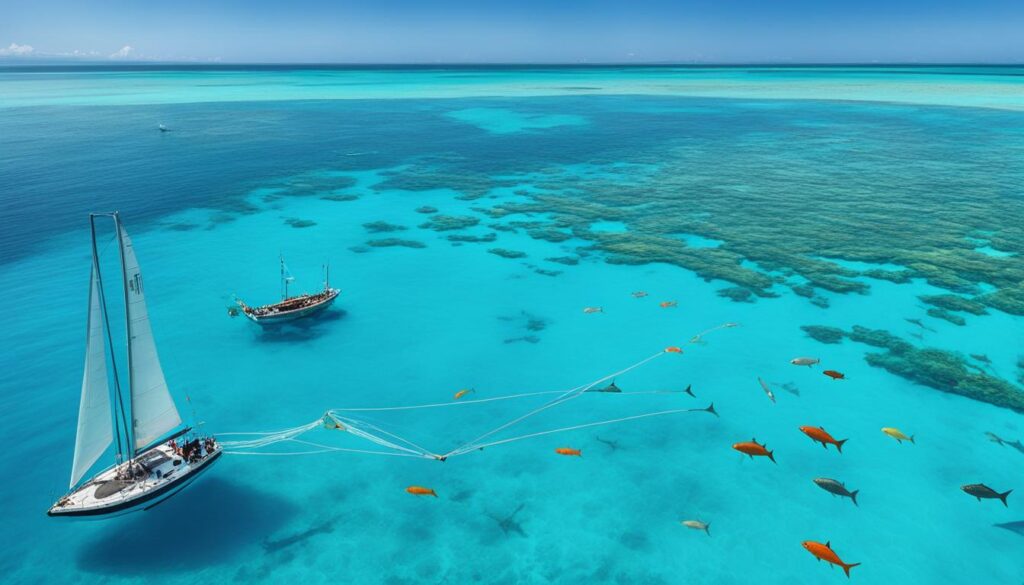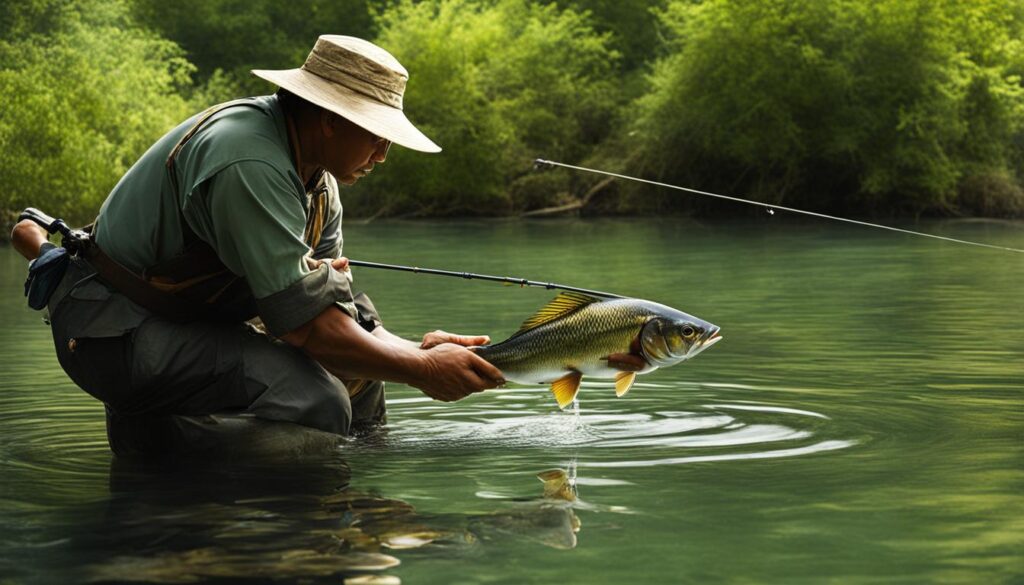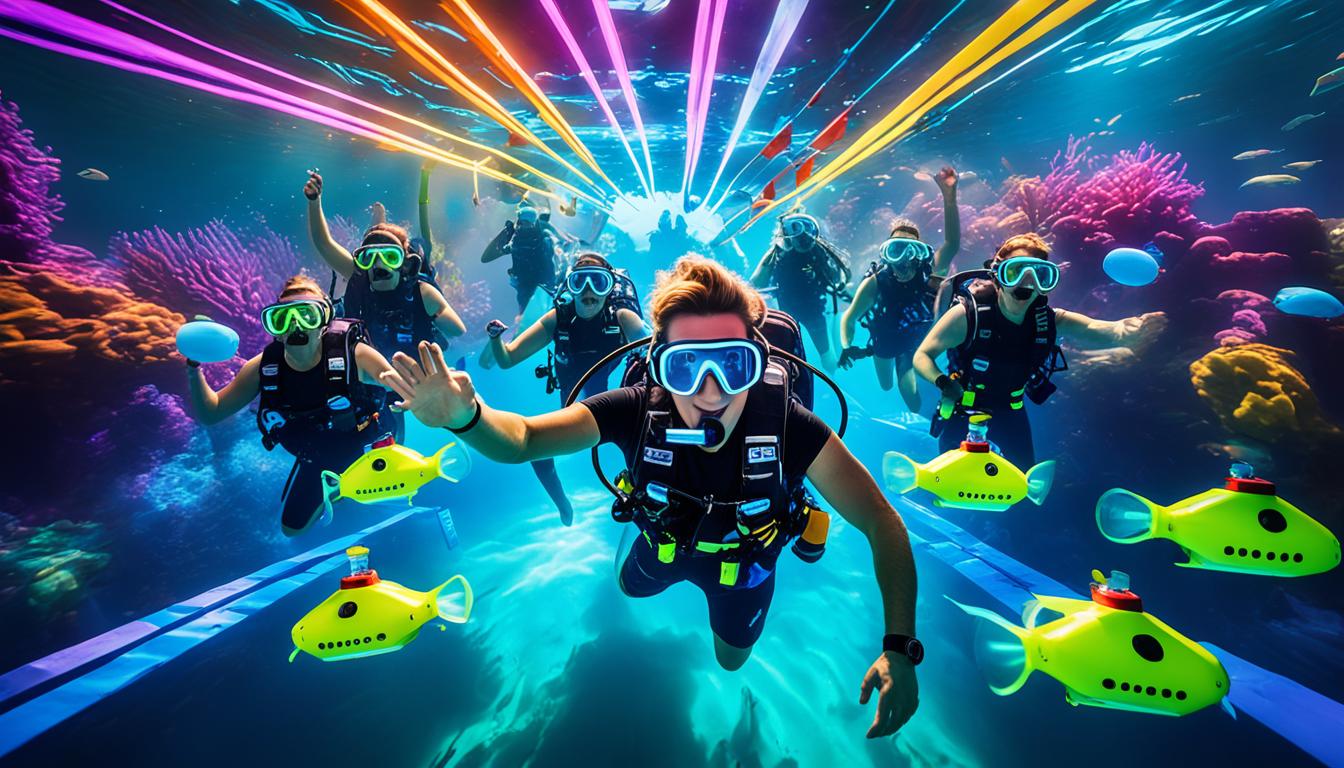The great outdoors offers a sanctuary where the ripple of waves and the tug of a fishing line bring us back to nature’s embrace. As outdoor enthusiasts, we have a shared responsibility to protect these aquatic playgrounds that gift us with so much joy. That is where sustainable boating and eco-friendly fishing emerge not just as concepts, but as essential practices to preserve our waterways for the generations that will follow. By embracing sustainable fishing techniques, prioritizing boating safety, and selecting the right fishing gear, we can continue to cast our lines and set our sails without compromising the health of the planet’s vital blue spaces.
Whether you are a seasoned mariner or a weekend angler, the adoption of mindful habits when on or near the water can make a significant difference. In this discussion, we will navigate through various actionable steps and innovative technologies that align with the spirit of conservation, ensuring each voyage and every catch is done with the utmost respect for our delicate marine environments. Join us as we journey through the world of watercraft and angling, where each choice can lead to a more sustainable future for our beloved aquatic habitats.
Key Takeaways
- Integrating sustainable practices in boating and fishing safeguards our waterways.
- Utilizing eco-friendly fishing gear helps minimize detrimental effects on marine life.
- Responsible boating safety measures extend beyond personal well-being to environmental protection.
- Adopting sustainable fishing techniques supports the longevity of fish populations and their habitats.
- Technologies in boating and fishing can greatly enhance eco-friendly practices on water.
The Importance of Sustainability in Boating and Fishing
The serenity of the open water and thrill of a good catch have drawn countless enthusiasts to the realms of boating and fishing. However, the reflection of the sun on the waves belies a deeper importance—the pressing need to maintain the health of our marine ecosystems. As we explore the vast blue, it’s crucial to anchor our actions in sustainable boating practices and ethical fishing.
Understanding the Impact on Marine Ecosystems
Marine ecosystems are intricate networks of life that are as delicate as they are diverse. The ripple effect of unsustainable boating and fishing can lead to habitat destruction, water pollution, and the disruption of aquatic life cycles. Sustainable measures act as gentle oars steering these fragile environments away from the brink of degradation.
The Role of Enthusiasts in Conservation Efforts
Those who cherish the open waters hold the tiller of destiny for marine life. Through simple but impactful actions like complying with fishing regulations, practicing catch and release, and opting for eco-friendly boat rentals, boating and fishing aficionados can lead the flotilla for conservation efforts. Their passion, if channeled through the prism of sustainability, can contribute to the longevity of marine habitats and fishing stocks.
Legal and Ethical Considerations for Sustainable Practices
Navigating the tides of sustainability includes a keen understanding of the legal frameworks that govern our waterways. These regulations are not meant to be an anchor but a compass—guiding us toward fishing practices and boating behaviors that protect the aquatic environment. Ethical fishing goes beyond the catch; it’s a commitment to abide by seasonal guidelines and size limits, ensuring that the aquatic world remains bountiful and biologically diverse for generations to come.
Eco-Friendly Boating Practices
Engaging in sustainable boating techniques is not just beneficial for the environment; it significantly enhances your boating experience by ensuring that the waterways remain pristine for future adventures. One of the first steps towards adopting a green boating lifestyle is opting for eco-friendly boat rentals, which provide a fleet of vessels designed with the environment in mind.

In addition to choosing eco-conscious rentals, there are several boating tips that every water enthusiast can implement to promote green boating. Below are essential guidelines to consider:
- Regularly servicing engines to prevent leaks and increase fuel efficiency.
- Using non-toxic, biodegradable cleaning products.
- Properly disposing of waste, never overboard.
- Utilizing renewable energy sources where possible, such as solar panels for auxiliary power.
Emphasizing these practices not only mitigates the environmental impact but also inspires others in the boating community to adopt similar habits. Furthermore, operating your boat efficiently by controlling speed and avoiding unnecessary idling can significantly reduce fuel consumption, demonstrating a commitment to conservation even while on the water.
Here is a comparative table of conventional versus sustainable boating practices:
| Conventional Boating Practice | Sustainable Boating Practice |
|---|---|
| Traditional outboard motors | High-efficiency or electric motors |
| Chemical cleaning agents | Eco-friendly, biodegradable cleaning products |
| Excessive speeds and idling | Efficient speed management and reduced idling |
| Disposal of waste in waterways | Onshore waste disposal and recycling |
By following these sustainable boating techniques and choosing eco-friendly boat rentals, boaters ensure that the natural beauty and vitality of marine habitats are preserved. This commitment to green boating not only guarantees that we can continue to enjoy our waterways but also safeguards the diverse ecosystems that depend on them.
Sustainable Fishing Techniques That Make a Difference
As we delve into the realm of sustainable fishing techniques, it’s essential to recognize the practices that are conducive to fishing conservation. Anglers worldwide are adopting catch and release methods, a cornerstone of responsible fishing, that ensure the vitality of fish populations for generations to come. In this section, we put the spotlight on strategies that not only enhance the fishing experience but also safeguard our aquatic resources.

Implementing sustainable fishing techniques encompasses a comprehensive approach to the sport. Behavioral changes, like adhering to fishing regulations, selecting the appropriate gear, and recognizing the importance of each species’ role in the ecosystem, can lead to profound ecological benefits. Below, we have charted a course for anglers seeking to refine their fishing practices and contribute positively to marine conservation.
- Catch and Release: This tactic is not just about freeing the fish; it’s applying the method with care. Use barbless hooks for minimal injury and keep the fish in water as much as possible during the release.
- Selective Fishing Gear: Select tools and methods, such as circle hooks and nets of adequate size, to avoid bycatch and reduce harm to juvenile and non-target species.
- Seasonal and Size Regulations: Be mindful of the best times to fish and the mature sizes to catch, ensuring you’re not depleting breeding stocks or disrupting natural cycles.
By actively engaging in these sustainable practices, every angler can become a steward of the environment. The ripple effect of such responsibility leads to healthier fisheries and a more balanced marine ecosystem, where recreation aligns with the foundational goals of conservation.
Remember, responsible fishing doesn’t just hinge on the practices you adopt while on the water; it’s also about being informed, spreading awareness, and encouraging the fishing community to join the movement towards sustainability.
Innovations in Fishing Gear for Reduced Environmental Impact
The landscape of recreational and commercial fishing is constantly evolving with the introduction of new technologies and materials aimed at reducing the environmental footprint of the sport. Anglers are now equipped with an array of options that are not only effective but also eco-conscious. In this section, we explore how the latest innovations in fishing gear contribute to a more sustainable future for our waterways.
Biodegradable Tackle Options
One of the most exciting developments in the fishing industry is the creation of biodegradable fishing tackle. These products offer a solution to one of the perennial challenges of fishing: tackle loss. Traditional gear can persist in the environment for hundreds of years, posing a threat to wildlife and ecosystems. Biodegradable alternatives, on the other hand, are designed to break down naturally over time, vastly reducing their potential for harm.
Biodegradable hooks and lures made from materials like PLA (polylactic acid) derived from corn starch, or other natural compounds, provide the durability needed for a successful catch while ensuring environmental safety. Transitioning to this type of tackle greatly reduces the angler’s environmental impact, particularly in terms of plastic and metal pollution.
Advancements in Selective Fishing Gear
The fishing industry has made considerable strides in addressing bycatch, which is the unintentional capture of non-target species. Selective fishing gear is designed to target specific fish sizes and species, thereby protecting juvenile fish and maintaining biodiversity. Innovations include modified hooks, nets with escape rings for smaller fish, and time-release bait systems that help in preserving critical species and respecting the natural balance of aquatic habitats.
Technology Integration in Fishing Equipment
The integration of fishing equipment technology is changing the way we approach the water. GPS and sonar tools allow for precision in locating fish habitats, leading to more efficient fishing and reduced overfishing in a given area. Equipment fitted with environmental sensors can also provide real-time data on water quality and temperature, enabling anglers to make informed decisions that align with conservation efforts and local fishing conditions.
These technological advancements have not only made fishing more sustainable but also more rewarding for those who are passionate about the sport. By embracing the latest gear equipped with eco-friendly features, anglers can enjoy the pursuit while actively contributing to the protection and preservation of our precious waterways.
Selecting Eco-Friendly Boat Accessories and Equipment
As the tide turns towards sustainability, the demand for eco-friendly boat accessories and green boating equipment surges. Conscious boaters are seeking ways to harmonize their passions with environmental stewardship, and the market is responding with an array of products that embody efficiency and eco-sensibility.
Among the standout options are innovative high-efficiency motors that promise to propel your vessel with minimum energy waste. Switching to an electric or hybrid propulsion system can significantly reduce your carbon footprint and dependency on fossil fuels. Furthermore, integrating solar panels into your boating apparatus empowers you to harness solar energy, thus reducing the need for conventional battery charging methods.
Cleaning and maintenance tasks also play a crucial role in preserving our blue planet. Non-toxic, biodegradable cleaning products have emerged as a staple in a boater’s arsenal, allowing for the upkeep of boats without the guilt of polluting the waterways. These products are designed to break down harmlessly in marine environments, protecting water quality and aquatic life alike.
For boaters aspiring to embrace ecological responsibility, here’s a focused shopping list of boat accessories that align with green values:
- Solar-powered lighting and docking systems
- Onboard recycling and composting solutions
- Eco-friendly anti-fouling paint and varnish
- Water-saving faucets and toilets
- Organic hemp or flax fiber ropes
- Recycled or sustainable material deck mats
Embracing green boating equipment is more than a trend; it is a commitment to the future health of our waterways. When selecting boat accessories, consider the product’s lifecycle, energy needs, and disposability. Your choices have the potential to influence industry standards and contribute to a wave of positive environmental impact.
Remember, each small change in your boating gear and habits can have a ripple effect, resulting in a cleaner, greener future for all who enjoy the splendor of sailing, fishing, and simply marauding the open waters.
Boating, Fishing – Harmonizing Hobbies with Habitat Preservation
Blending the passion for boating and fishing with dedication to environmental care presents a unique opportunity to protect the very habitats that provide these recreational pleasures. Each choice made on the water has a ripple effect, highlighting the need for conscientious behaviors that ensure the longevity of our marine ecosystems. Engaging in practices that support sustainable fishing spots, espousing green boating tips, and considering sustainable boat rentals and boat sharing are pivotal steps toward this harmonization.
Mapping Sustainable Fishing Spots
Identifying and endorsing sustainable fishing spots requires a mind tuned to ecological balance. Utilizing comprehensive maps and databases that mark areas managed for conservation helps anglers make informed choices, directly supporting marine preservation efforts. These spots often operate under strict policies to maintain fish populations and habitat health, providing ethical anglers with locales where they can enjoy the sport while aiding in species survival.
Adopting Green Boating Tips
Boaters can leave a lighter ecological wake by incorporating green boating tips into their routines. Simple yet impactful actions, such as using eco-friendly cleaning products, maintaining engine efficiency, and preventing aquatic hitchhikers with proper boat cleaning, can substantially diminish the environmental impact. Shared wisdom amongst the boating community further propagates these eco-conscious habits, building a collective effort for waterway conservation.
Boat Rentals and Sharing – A Sustainable Option
Our world’s shift towards a sharing economy has reached the shores of boating, where sustainable boat rentals and boat sharing offer practical, environment-friendly alternatives to ownership. These services not only reduce manufacturing demands and the consequent resource depletion but also foster community engagement and accessibility. The following table provides a comparative view of the benefits of these sustainable options:
| Sustainable Boat Rentals | Boat Sharing |
|---|---|
| Decreased resource use for production and upkeep | Optimized usage of existing boats, maximizing utility |
| Opportunities to try different eco-friendly boats and technologies | Building a community of eco-conscious boaters |
| Professional maintenance ensures optimal environmental performance | Reduced personal storage needs and associated environmental footprint |
Conclusion
As we navigate the tailwinds of this article, it is clear that the waters of change are upon us. Embracing eco-friendly fishing practices and adhering to a sustainable boating guide are not just choices, but responsibilities that we carry as stewards of the waterways. The journey through sustainable methods in both boating and fishing underscores a collective duty: to ensure that the serenity and abundance of our aquatic environments persist well into the future.
The sea of information presented here serves as a beacon, guiding boaters and anglers alike towards practices that favor conservation and ecological awareness. Each technique and technology we adopt plants the seeds of environmental stewardship, cultivating a landscape where the hobbies we cherish can flourish without harming the ecosystems we depend on. It is a testament to the power of individual actions to make a substantive, positive impact on our planet’s precious blue spaces.
In closing, let us anchor this knowledge in commitment and action. Continue to seek out and implement ways to integrate sustainability into your maritime adventures. Your conscious choices ripple outwards, creating waves of transformation that can preserve the beauty and biodiversity of our waters for generations of boaters and fishers to come. By embodying the essence of care and respect for nature, we can all enjoy our favorite hobbies in harmony with the health of our planet’s life-giving waters.
FAQ
What is sustainable boating and why is it important?
Sustainable boating involves adopting practices and technologies that minimize the environmental impact of boating activities to preserve waterways. It’s important because it ensures that marine ecosystems thrive and are preserved for future generations while allowing us to continue enjoying boating activities responsibly.
How do boating and fishing activities affect marine ecosystems?
Boating and fishing can disrupt habitats, overfish populations, and pollute waterways with waste and fuel spillage. These activities can also lead to increased carbon emissions and damage to aquatic flora and fauna. Sustainable practices help mitigate these impacts.
What are some examples of sustainable fishing techniques?
Sustainable fishing techniques include catch and release practices, using selective gear that minimizes bycatch, adhering to fishing regulations to maintain fish populations, and choosing fishing gear designed to minimize environmental damage, such as biodegradable tackle.
What role do boaters play in conservation efforts?
Boaters play a pivotal role in conservation by adopting eco-friendly practices such as proper waste disposal, using fuel-efficient engines, selecting eco-friendly boat rentals, and following boating safety guidelines that protect the environment.
Can technology help with sustainable fishing and boating?
Yes, technology can greatly assist in sustainable fishing and boating—GPS systems enable precise navigation to reduce fuel consumption, sonar can help locate fish more efficiently to reduce time on the water, and advancements in gear, such as biodegradable tackle, lessen environmental impact.
Are there eco-friendly boat accessories I can use?
Certainly! There is a variety of eco-friendly boating accessories, including solar panels, high-efficiency motors, LED lighting, and environmentally safe cleaning products. These accessories can help reduce your carbon footprint and protect the water environment.
How can I find sustainable fishing spots?
Sustainable fishing spots are often those managed for conservation and have regulations in place to ensure fish populations are protected. Researching local regulations, seeking out spots with conservation practices, and using resources from conservation organizations can help locate these areas.
What is the advantage of sustainable boat rentals and boat sharing?
Sustainable boat rentals and boat sharing can greatly reduce the environmental. It impacts by maximizing the usage of a single boat rather than having many privately-owned boats rarely used. It can lead to fewer boats being manufactured and a collective reduction in boating-related pollution

